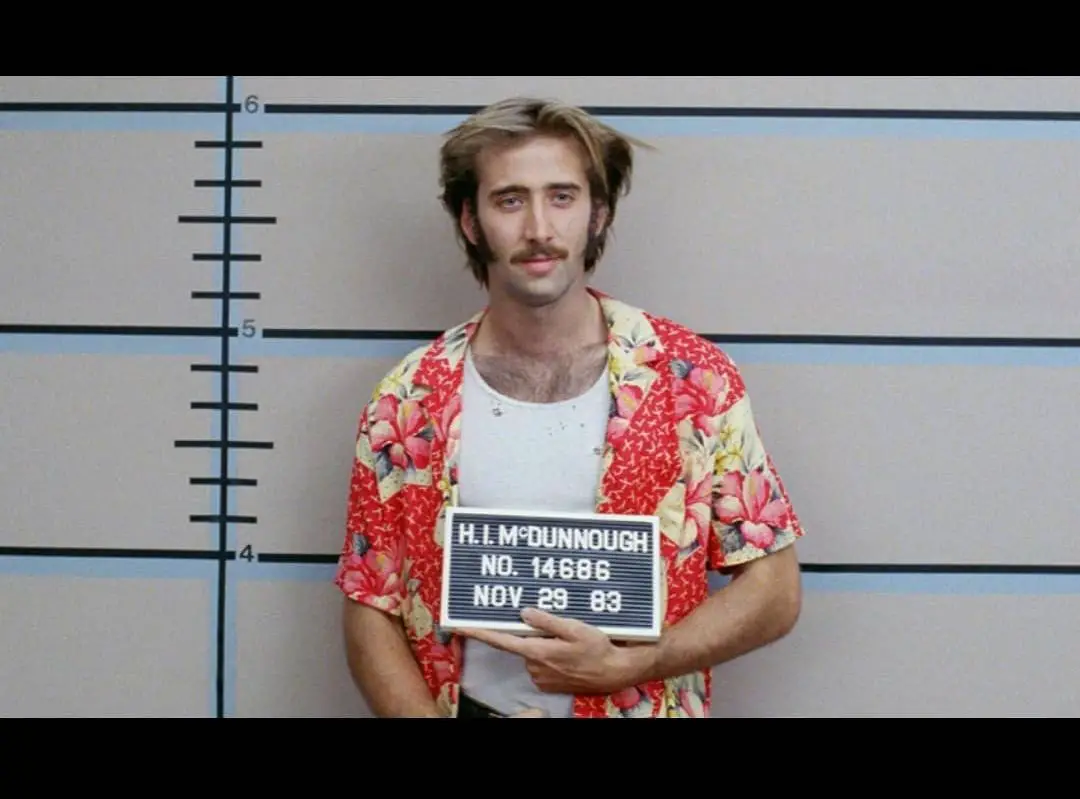It’s high time to discuss the controversy surrounding the talents of Nicolas Cage. Thanks to a number of performances some consider to be overly volatile, Cage has earned a reputation as a barely restrained madman waiting to be released onto a film set. On multiple occasions, I’ve had friends flatly refuse to watch a movie featuring the actor, confident that it won’t be anything more than Cage screaming and smashing things.
I feel sorry for these people: they’re denying themselves some rich cinematic experiences. Here, I offer a sampling of performances meant to counter the unfair reputation that’s been attached to the actor. Drawn from films throughout his career, these roles either defy Cage’s typecast, or show how he can transcend it.
“Raising Arizona”
Long before “Ghost Rider” or “The Wicker Man,” Cage starred in an early Coen brother’s movie, which today is often overshadowed by the duo’s later successes. Set in Tempe, Arizona, “Raising Arizona” tells the story of H.I. McDunnough (Cage), a scruffy, but charming, repeat offender who can’t resist sticking up gas stations, and Ed (Holly Hunter), the mugshot photographer who falls in love with him.
H.I. decides to go straight for Ed, and the two marry and live in bliss, until it’s discovered that Ed can’t have children. When the couple learn that quintuplets have recently been born to a wealthy local family, they hatch a plan to heist one of the kids.
What follows is a goofball comedy, made up of wild chases, slapstick fights and the kind of memorable dialogue that the Coen brothers are known for. Viewers more familiar with the Cage of “National Treasure” might be surprised by how studly a young Nicolas Cage is.
With his mustache and long mess of hair, he makes for an attractive ragamuffin. For the most part, he keeps the crazy in check, only unleashing a few good howls when the story begins to spin out of control. Otherwise he’s affable and a little goonish, and perfectly channels the character created for him.
“Adaptation”
The most frustrating aspect of Cage-hate is its failure to consider the full scope of the actor’s work and successes. At this point, few seem to remember that the actor has been nominated for multiple Academy Awards and worked with several prestigious directors. It’s this kind of disregard that has allowed a movie like “Adaptation” to slip through the cracks.
The second joint effort of director Spike Jonze and screenwriter Charlie Kaufman, “Adaptation” is an inventive and mind-bending comedy, built upon Kaufman’s signature brand of meta storytelling. Cage plays Charlie Kaufman, the screenwriter, who is struggling to adapt the nonfiction book “The Orchid Thief” for the big screen. He also plays Donald Kaufman, Charlie’s fictional brother, a joyful and slightly dopey person who lives with Charlie and aspires to write movies as well.
Hampered by a debilitating level of self-doubt, Charlie first attempts to focus his screenplay on the beauty of orchids, then on his own creative chaos and finally on the author of “The Orchid Thief,” Susan Orlean (a real person, played in the movie by Meryl Streep). It soon becomes clear that the movie Kaufman is attempting to write is the same movie viewers are watching, and its sudden shifts in direction reflect Kaufman’s attempts to get the project off the ground.
“Adaptation” is a far more cerebral movie than is typically associated with Cage, and it showcases a part of his range that often gets overlooked. When playing Charlie, Cage shows no trace of the extreme characters he’s become infamous for; the character is neurotic and anxious, and frequently a giant mess, but all of this is painfully subdued.
Throughout the movie, Charlie attempts to express his romantic feelings for Amelia (Cara Seymour), repeatedly finding himself paralyzed by his own anxiety. In these scenes, and many others, Cage says very little, but still communicates a lot, demonstrating his ability to perform with subtlety and restraint.
“Mandy”
Of course, there’s still something to be said for Cage’s more unhinged side. When placed in the proper context, his hysterics can provide a manic energy that’s difficult to find anywhere else in Hollywood. And if there’s ever been a proper context, it was “Mandy.”
The movie tells the story of Red (Cage) and Mandy (Andrea Riseborough), an odd couple who live together in a cabin secluded in the woods. The year is 1983, but the two seem more in tune with another time: Mandy rocks a Black Sabbath t-shirt, and the pair are engrossed by old science fiction flicks on TV.
They enjoy their reclusive romance, until Mandy is abducted by a psychedelics-crazed sex cult, led by the delusional and psychotic Jeremiah Sand (Linus Roache). When Mandy refuses to become Sand’s lover, she’s murdered, setting the stage for Red to go on a rampage, fueled by vengeful wrath and a powerful dose of acid.
“Mandy” is a traditional revenge story, wrapped in layers of psychedelic horror, pulp fantasy and heavy metal. Visually the movie is stunning, and frequently overwhelming, obviously inspired by the kinds of drugs that play such an important role in the plot. With a color palette heavy on seething reds and purples, and a bag of tricks that include characters swapping faces mid-monologue, director Panos Cosmatos delivers an aesthetic and mood in a category of its own.
Thanks to the hallucinatory quality of the movie, along with the total commitment of the rest of the cast, nothing Cage does seems too over-the-top. His wild side is exactly what the film needs in a protagonist. Few actors could pull off lighting their cigarette from the flaming head of an enemy, but when a blood-soaked and bug-eyed Nicolas Cage does, it makes perfect sense.
So, before vetoing a movie simply because it stars Nicolas Cage, consider these three movies. While it seems likely that the actor will continue drifting into the status of a weird, ranting meme in the broader consciousness of pop culture, you and I will know what a treasure he truly is. It’s actually pretty nice in the Cage.
















